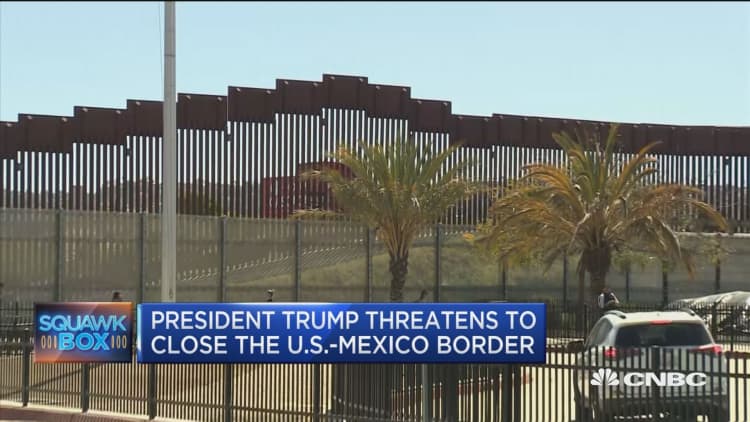U.S. Customs and Border Protection arrested nearly 51,000 migrants in August at the southern border, a sharp decline compared with the previous month, a top Trump administration official said Monday.
"Trump is making it clear: if you come to the United States illegally, you will be removed," said Mark Morgan, acting commissioner of Customs and Border Protection, in a press briefing. "The president has made it very clear to use every tool available to him to address this crisis."
The CBP and U.S. Army Corps of Engineers have also constructed 65 miles of border wall, and plan to build the rest of it by the end of 2020 to deter migrants at the border, Morgan said.
"Every single mile of wall is built, this country is more safe," he said.
President Donald Trump has made reducing illegal immigration a top priority of his administration and reelection campaign. The latest figures indicate his immigration crackdown may be reducing the number of migrants apprehended at the southern border.
Morgan added the August border apprehension numbers reflect a 56% reduction when Border Patrol arrested nearly 133,000 migrants in May. Arrests are also down nearly 30% from close to 72,000 in July.
The White House is pressing Congress to provide more money to build a border wall. The Supreme Court in July allowed the administration access to $2.5 billion from a Pentagon counterdrug fund for construction.
Last week, the Defense Department announced it would use $3.6 billion in military construction funds to pay for border projects in California, Arizona, New Mexico and Texas.

Jessica Bolter, associate policy analyst at the Migration Policy Institute, said a border wall can't be the "sole policy" to deter migrants from coming to the southern border.
"It's not going to stop families who are coming, and there needs to be a more layered approach," Bolter said. "I don't think there is a lot of dangerous people coming over to the southwest border based on the statistics we have. The main demographics is families and children."
She said the reduction of migrants apprehended in August is likely due to the increase in Mexican enforcement as well as measures the Trump administration has implemented to limit people's access to the U.S. asylum system.
The Trump administration has also expanded its "remain in Mexico" program, which sends asylum seekers arriving at ports of entry back to Mexico while they wait for their immigration proceedings.
Brian Griffey, regional researcher at nongovernment organization Amnesty International, said sending migrants back to Mexico is "extremely dangerous" because it exposes them to criminal cartels that control broad areas of the Mexican border.
"These people in some cases have been sexually assaulted, abducted, or otherwise harmed while they're waiting to access the U.S. asylum system to pursue their claims," Griffey said. "These people largely don't have lawyers, they don't have any means of getting information about the court, they are just given basically a temporary paper they're supposed to come back to this bridge or other port of entry, and until then, they're on their own."
"This is really an abandonment of the United States legal obligations towards refugees, which is pushing the world's most vulnerable people back into a cauldron of violence in northern Mexico that even the U.S. State Department warns people not to go into because it is so dangerous," he added.


